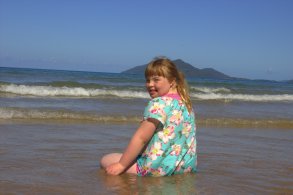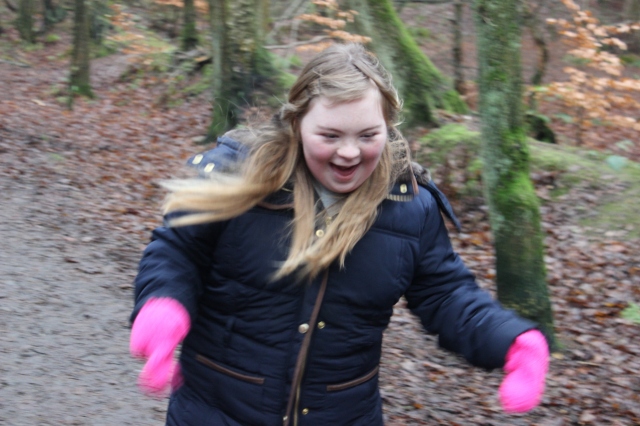
 Ava is 12 years old and has Down’s syndrome and an Autistic spectrum condition. She is in year 7 at a mainstream high school.
Ava is 12 years old and has Down’s syndrome and an Autistic spectrum condition. She is in year 7 at a mainstream high school.
Last month my husband and I sat in a quiet office in a CAMHS building (Children and Adult Mental Health Service for those who haven’t spent as much time in their care as we have), being told that our girl; the girl who’s spent the last 6 months planning her birthday party sleep over; who gets giddy over Harry Styles; whose honesty around strangers makes my toes curl; has a diagnosis of being on the Autistic Spectrum.
As we walked back to the car my husband asked me how I was feeling. My answer was, ‘not surprised, but proud.’
In truth, we’d wondered out loud to ourselves on several occasions about the Autistic Spectrum Condition thing, especially as we’d watched Ava get more and more anxious over unexpected or persistent noise, noted how she checked several times a day, every day, every week, what we were doing that day, the next day, and where we were going on holiday in the summer. It hadn’t passed us by that she’d become overwhelmingly attached to a souvenir shop Union Flag, so much so that she couldn’t settle until she had it in her hands, and ironically, that she’d get anxious around people who had a disability that resulted in them displaying behaviours like rocking, or squealing. With our limited knowledge of ASC we’d always ultimately dismissed the possibility that it might be something Ava had, as we believed that people with Autism couldn’t read other people’s emotions, and Ava we’d decided, was very intuitive about how we were feeling.
When our community nurse, with some trepidation, initially mentioned ASC to me, I countered that I wasn’t sure Ava could have the condition based upon her emotional intelligence. ‘She can tell when I’m sad,’ I’d said. ‘She’ll ask me: Are you sad Mummy?’ Our nurse pointed out that she could be asking this question, repeatedly, exactly because she needed the emotions identifying for her, because she couldn’t recognise them for herself.
So, not surprised. But proud. Why proud? Because Ava was diagnosed with Down’s syndrome within hours of birth, by the time she was 8, she was in a wheelchair as a condition called Perthes Disease took hold of her hip joint and saw it crumble away to nothing, and then at 11 she was being diagnosed with ASC, but in spite of the things that many might think ‘bad luck’, or hard to cope with, our girl is no longer in a wheelchair, she gets the school bus with all the other kids to her mainstream high school each day; she’s making great progress in all her core subjects; she’s an amazing swimmer and will tell anyone who asks that she wants to be a swimming teacher when she’s ‘a lady’; she has a great group of friends, some with Down’s Syndrome, some without, that she enjoys spending time with; she goes to Guides and has been canoeing, wall climbing and camping with them (without Mum being there); and she’s happy!

So, what’s the point of us having a piece of paper that tells us Ava has ASC as well a Down’s syndrome then? Well, over the years we’ve grown used to Ava’s little quirks and so have developed effective strategies to cope with the negative behaviours that can result in her processing the world in a different way, but at her school, and at other organisations where our girl will want to spend her time, that piece of paper should help the people that come into contact with her to make allowances, to consider adjustments, to think as creatively as we do about how to motivate her, and how to make her feel safe. We’re also told that further down the line, when she might want to consider leaving home, that diagnosis will help us in finding the right support to make that huge transition in her life a success.
So as I watch Ava, her flag waving gently in one hand, asking a woman in the doctor’s waiting room, a woman we’ve never met before, why she’s got a spot on her chin, I think to myself, nothing’s changed, she is who she is, she’ll continue to strive, to achieve, to learn and to grow, but as she does all those things I’ll be more proud of her than ever before.

 Ava is 12 years old and has Down’s syndrome and an Autistic spectrum condition. She is in year 7 at a mainstream high school.
Ava is 12 years old and has Down’s syndrome and an Autistic spectrum condition. She is in year 7 at a mainstream high school.
 Ava is 12 years old and has Down’s syndrome and an Autistic spectrum condition. She is in year 7 at a mainstream high school.
Ava is 12 years old and has Down’s syndrome and an Autistic spectrum condition. She is in year 7 at a mainstream high school.

This is a lovely lovely story well done all of you. It’s made my day. X
LikeLiked by 2 people
I relate to you 100 per cent, I have a boy who is the same age and in exactly the same place in development as your beautiful girl, and to read your lovely story was like reading my own. The key is committed people in every area of our children’s lives sharing their dreams, supporting their aspirations and understanding their unique needs.
LikeLiked by 2 people
Oh my, Ava sounds adorable, an honest, friendly person whom I would love to meet.
LikeLiked by 2 people
Ava is a beautiful child, she is funny and loving and temperamental and unique. In fact all the exact same things that I would have said about her wonderful Mother at the same age. The fact that Ava is now diagnosed with ASC as well as Downs Syndrome really only will help with future provisions, and with explaining some of the different ways she responds to things, it doesn’t take away from all the amazing characteristics that make her Ava. I know that you all feel blessed that she is part of your life, and I think she is also blessed to have you all as such a strong loving family and extended family. x x x x
LikeLiked by 2 people
Thanks Linny! xxx
LikeLike
What a super positive post! We found the ‘diagnosis’ helpful in how services viewed our daughter and the provision they have to provide is directed more towards her ASC which is good. Our daughter also has Perthes. Did Ava have surgery for her hips?
LikeLike
It’s good that the ASD is not impacting in her daily life
LikeLike
Hi Fran! What a coincidence! Ava is now in the final stage of the Perthes cycle, and although she walks with a notable ‘hobble’ due to one leg being a fraction shorter than the other, we have avoided surgery. Each month we notice a marked improvement in Ava’s mobility, with her walking further, and beginning to change legs as she walks up stairs, rather than always leading with her ‘good leg’. Where’s your daughter up to in the cycle?
LikeLike
My 38 year old son has a dual diagnosis – he has down syndrome and is on the spectrum. He was tested at age 3, and the specialist told me he was on the spectrum, but suggested we not “get” the formal diagnosis as his differences were explainable by the D.S., and his needs would be met. I don’t know how a professional could have been so misinformed. Nathan wasn’t given the formal diagnosis, and as a result, his differences were treated as if they were behavioral or based in trouble at home. Eventually he did get placed in a multi-handicapped class, which was where he belonged, and his teachers let me know that they understood he was indeed autistic. In fact, the autistic end of his “Nathan-ness” is far more significant than is the D.S. He would be eligible for additional benefits and supports if he had the formal diagnosis. You were so right to go with it. Research shows that nearly 10% of folks with D.S. also have autism. This was relatively unknown till a few years back, and still is largely ignored by many. It would be good if more folks spoke of their experiences. Thank you for doing so!
LikeLike
What a special person you have.
LikeLike